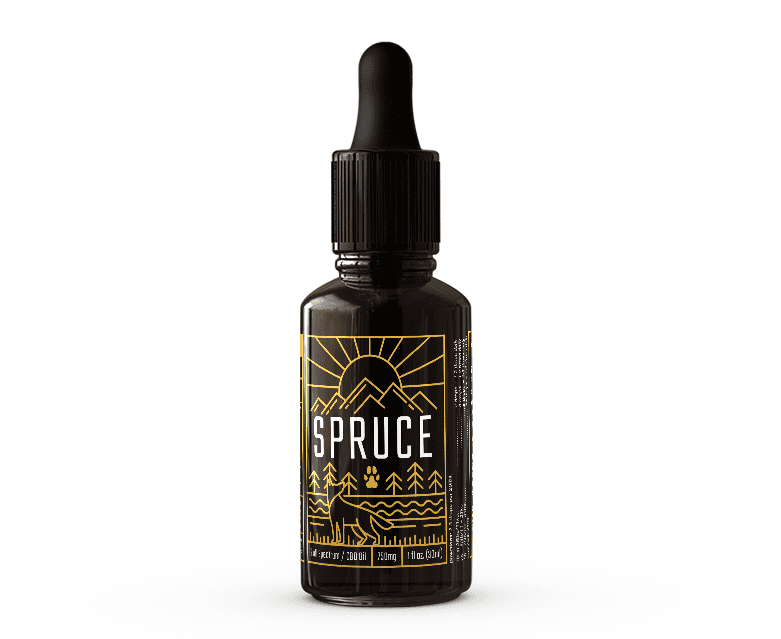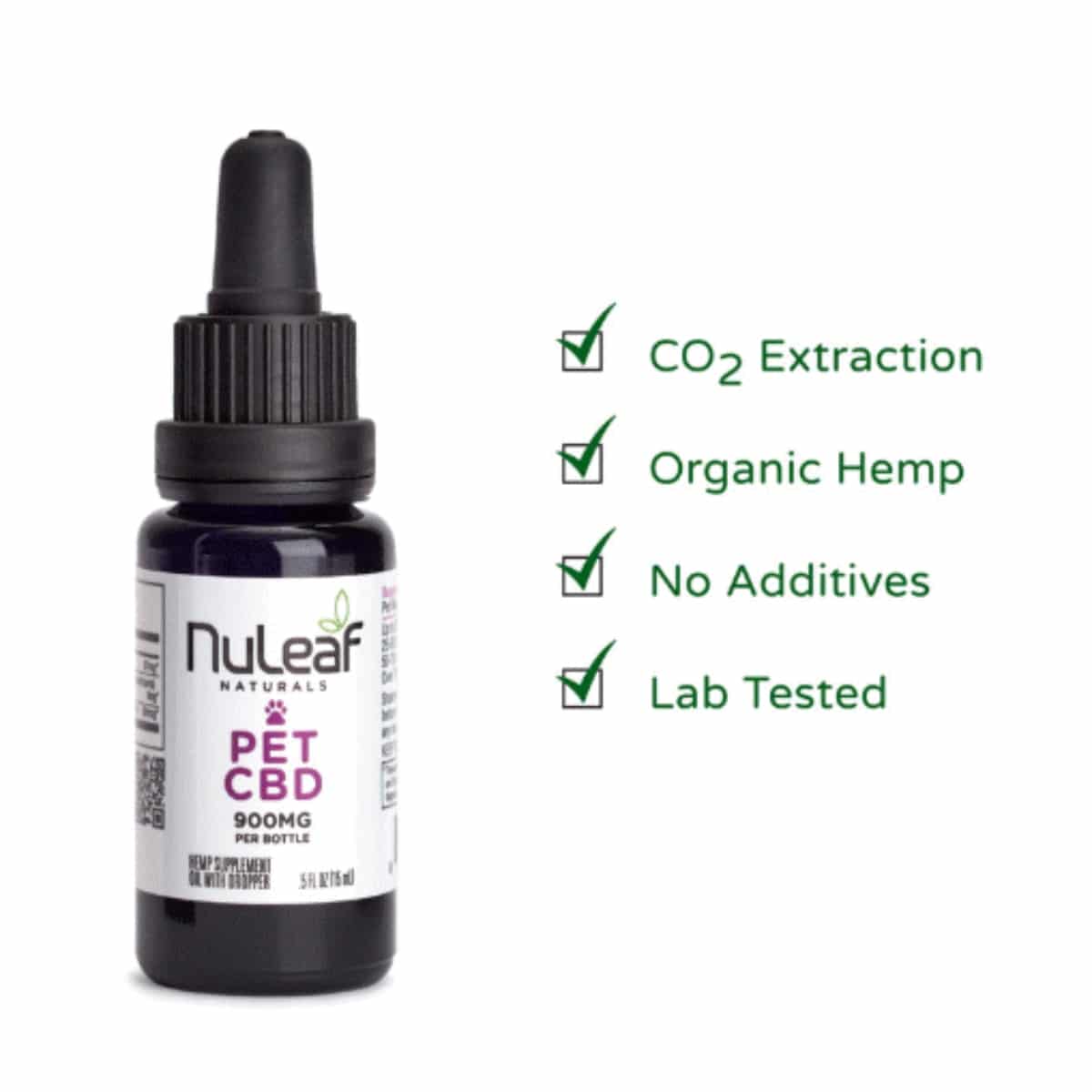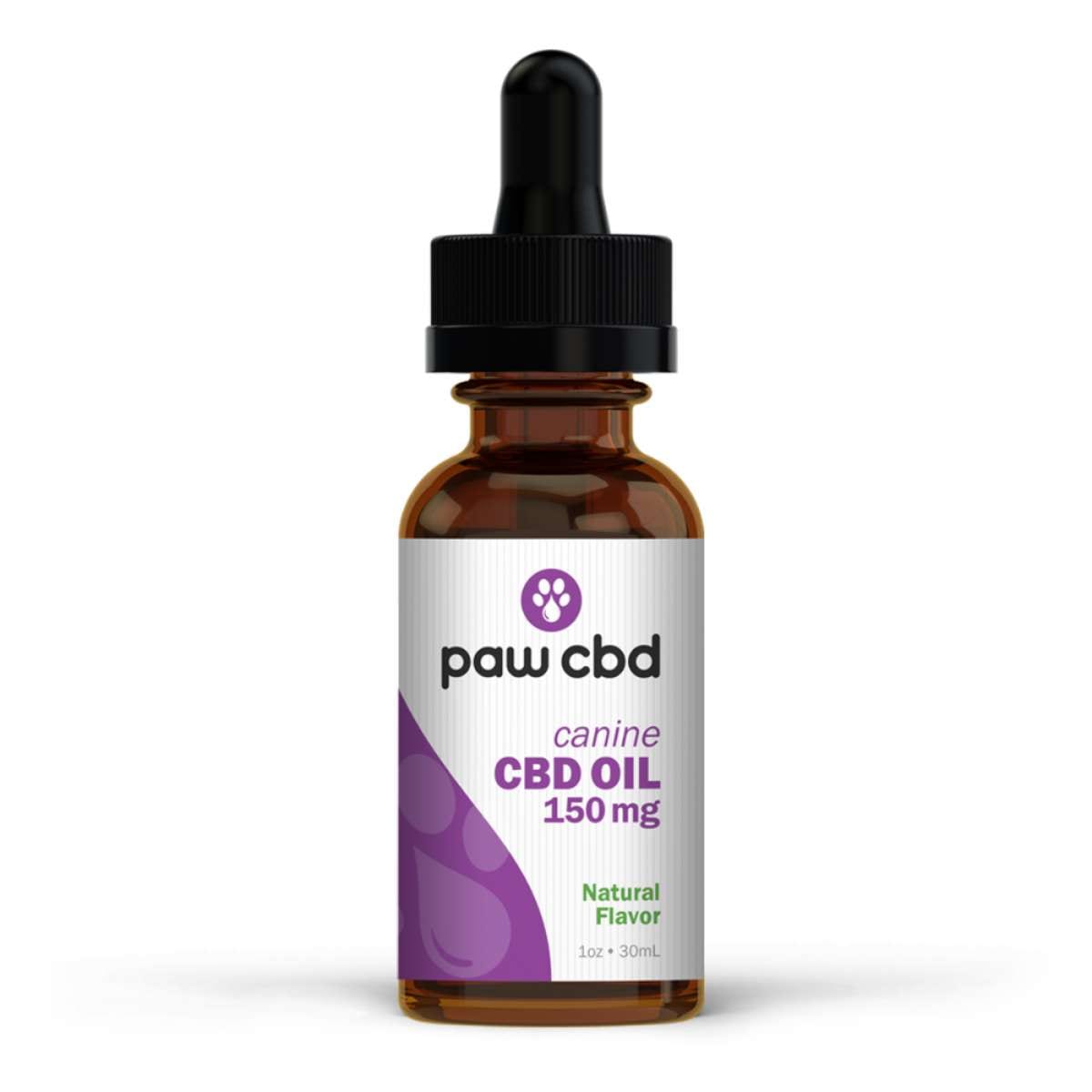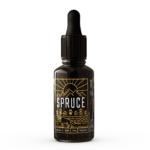Can CBD Oil Help With Dog Aggression?
- CBD may be effective in treating dog aggression because it helps facilitate serotonin’s effects in a dog’s body(1). Serotonin is a neurotransmitter and a chemical that regulates social behavior, mood, and appetite(2).
- Anxiety is one of the primary causes of canine aggression. A study in 2019 has found that CBD treats a variety of anxiety disorders, including social anxiety disorder, panic disorder, and post-traumatic stress disorder(3).
- One of the underlying causes of aggression in dogs is chronic pain. CBD may be useful in treating this condition. A 2018 study shows that CBD increases comfort and activity in dogs who have osteoarthritis(4).
- CBD has a safer profile compared to medications usually prescribed for dog aggression(5). However, more studies need to be conducted on CBD’s health benefits on aggressive dogs.
- Pet parents should consult with their dog’s veterinarian first before administering CBD to their dogs.
Best CBD Oils for Dog Aggression
Spruce Dog CBD Oil 750mg
Dog-Friendly CBD Oil
-
Overall Clinical Score
99%Best Overall -
Score
breakdown
-
Summary
Spruce’s dog-friendly CBD has been specially formulated for dogs. Instead of hemp seed oil for the carrier oil, the product contains coconut oil, which is generally easier on the digestion for dogs. The taste is also milder with no flavorings, making it more likely that dogs will eat it with their food.
Using Spruce CBD for dogs is simple. All owners have to do is sprinkle the desired dose on the dog’s food at mealtime once or twice a day. Each dose should consist of about two to three drops per 20 pounds of dog weight.
Pros
Cons
-
Same as human lab grade, full spectrum CBD oil
-
Easier on Dog's digestion
-
Made from 100% organic and natural ingredients
-
No other flavors
-
-
Features
Discount pricing available? 20% Off Coupon Code: CBDCLINICALS Source Source of HempKentucky, USA & North Carolina, USA Form Oil Ingredients Full Spectrum Organic CBD Oil, Organic Coconut MCT Oil Type Type of CBDFull Spectrum Extraction Extraction MethodMoonshine extraction method How to take it Squirt 2 to 3 drops per 20lbs. of dog weight on the dog food one to two times per day. Picky eaters may need it stirred in, or covered with some food Up to 25lbs./11kg – 2 drops one to two times per day on the dog food 25-50lbs./11-23kg – 4 drops one to two times per day on the dog food 50-75lbs./23-34kg – 6 drops one to two times per day on the dog food Over 75lbs./34kg – 8+ drops one to two times per day on the dog food Potency Potency - CBD Per Bottle750 mg per bottle Carrier Oil Organic Coconut MCT Oil Concentration CBD Concentration Per Serving25mg of CBD per dropper full (1ml) Drug Test Not applicable Flavours Natural Price Range $89 ($75.65 for subscriptions, 15% discount from regular price) $/mg CBD Price ($/mg)$0.11 ($0.10/mg with subscription) Shipping Shipping/Time to delivery2-4 business days (first class USPS) Lab Tests Lab Testing TransparencyThird Party Lab Tested post formulation for safety and potency, available on website Contaminants Organic, Non-GMO, no pesticides, no herbicides, no solvents or chemical fertilizers, No preservatives or sweeteners Allergens Contains tree nuts (Coconut) Refund policy Within 30 days Recommended for All dog breeds Countries served USA only (all 50 states)
NuLeaf Naturals Full Spectrum Hemp CBD Pet Oil
Perfectly formulated CBD for Dogs, Cats, and other four-legged animals
-
Overall Clinical Score
99%Best Organic -
Score
breakdown
-
Summary
CBD for dogs, cats and other four-legged friends! Our product is concentrated to approximately 60mg cannabinoids per milliliter of oil. While this product is designed for pets, it’s great for humans, too.
Pros
Cons
-
Pure CBD hemp
-
All natural
-
No other flavors
-
-
Features
Discount pricing available? CBDCLINICALS20 Source Source of HempColorado, USA Form Oil Tincture Ingredients USDA Certified Organic Hemp Oil, Full Spectrum Hemp Extract Type Type of CBDFull Spectrum CBD Extraction Extraction MethodCO2 Method How to take it 2-3 drops per 20lbs Potency Potency - CBD Per Bottle300mg - 900mg Carrier Oil Organic Hemp Oil Concentration CBD Concentration Per Serving60ml per dropper full (1ml) Drug Test Not applicable Flavours Natural Price Range $38.50 - $179.50 $/mg CBD Price ($/mg)$0.12 - $0.19 Shipping Shipping/Time to delivery2-3 Days via USPS Lab Tests Lab Testing TransparencyThird Party Lab Tested post formulation for safety and potency, available on website Contaminants No additives or preservatives, Non-GMO, NO herbicides, pesticides, or chemical fertilizers Allergens Not specified Refund policy Within 30 days Recommended for All four-legged animals of any size and breed Countries served USA (all 50 states) and over 40 countries including Australia, Azerbaijan, Beliza, Bosnia & Herzegovina, Brazil, Chile, China, Croatia, Czech Republic, Estonia, France, Hong Kong, Hungary, Ireland, Israel, Japan, Latvia, Lebanon, Lithuania, Macao, Malaysia, Malta, Netherlands, New Zealand, Oman, Paraguay, Poland, Portugal, Saudi Arabia, Serbia, Singapore, South Korea, Sweden, Switzerland, United Arab Emirates, United Kingdom, Uruguay, and many more.
cbdMD Pet CBD Oil Tincture for Dogs
Powerful CBD oil for your canine friends
-
Overall Clinical Score
99%Best Range -
Score
breakdown
-
Summary
With nothing but MCT oil combined with CBD oil sourced from U.S. hemp that is grown using organic farming methods, these CBD Oil Tinctures for Dogs can be added to their favorite foods while still providing the same effects that you enjoy. We have two flavors to choose from: Natural and Peanut Butter.
Pros
Cons
-
Same CBD Oil benefits as for humans
-
No THC Animal-specific products (dogs, cats, horses)
-
Made from premium CBD from non-GMO USA hemp
-
Low terpene and cannabinoid profile
-
-
Features
Discount pricing available? 15% Off Coupon Code: cbdMD15 Source Source of HempKentucky, USA Form Oil Tincture Ingredients Cannabidiol (CBD) and MCT Oil (from palm kernel oil) Type Type of CBDBroad Spectrum Extraction Extraction MethodCO2 extraction method How to take it Every dog is unique, so you need to experiment a bit to work out the optimum measurement. Start by giving your pet a small amount every day and watch for improvement. If need be, gradually increase. Potency Potency - CBD Per Bottle150 mg - 3000 mg Carrier Oil MCT Oil (from palm kernel oil) Concentration CBD Concentration Per Serving150 mg - 5 mg per dropper (1ml), 300 mg - 10 mg per dropper (1ml), 750 mg - 25 mg per dropper (1ml), 1500 mg - 50 mg per dropper (1ml), 3000 mg - 100 mg per dropper (1ml) Drug Test Not applicable Flavours Natural and Peanut Butter Price Range $19.99 - $149.99 $/mg CBD Price ($/mg)$0.05 - $0.13 Shipping Shipping/Time to delivery2-5 Business days (via Fedex) Lab Tests Lab Testing TransparencyThird Party Lab Tested post formulation for safety and potency, available on website Contaminants 100% organic, non-GMO, and vegan-certified Allergens Vegan, Gluten free Refund policy Within 30 days Recommended for All dog breeds and sizes Countries served USA only (all 50 states)
CBDistillery CBD Pet Tincture
Pets can enjoy the same full CBD benefits as humans.
-
Overall Clinical Score
99%Best Value For Full Spectrum CBD -
Score
breakdown
-
Summary
CBDistillery’s Full Spectrum CBD Oil Pet Tinctures were made with your pets in mind. Formulated with cold-pressed hemp seed oil, your pets can now enjoy all of the same benefits of CBD that you do.
Pros
Cons
-
60-Day Satisfaction Guarantee
-
Hemp seed oil is safe for pets and aids in easy digestion
-
Oil extracted from aerial plant parts of US grown industrial hemp
-
Sourced from non-GMO industrial hemp grown in the USA through natural farming practices
-
Dropper is a bit shaky
-
-
Features
Discount pricing available? Save an extra 15% sitewide with code CBDCLINICALS15 Source Source of HempColorado, USA Form Oil Tincture Ingredients Hemp Seed Oil, CO2 Hemp Extract (Aerial Parts) Type Type of CBDOil Tincture Extraction Extraction MethodCO2 extraction How to take it Shake well. Give suggested dose at each meal at least twice per day. Suggested serving by weight: Under 25 lbs: 0.5 mL (10mg), 25-75 lbs: 0.5 – 1mL (10-20mg), Over 75 lbs: 1 – 2mL (20-40mg) Potency Potency - CBD Per Bottle150mg - 600mg Carrier Oil Hemp Seed Oil Concentration CBD Concentration Per Serving5mg - 20mg per full serving (1ml) Drug Test Not applicable Flavours None Price Range $20 - $38 $/mg CBD Price ($/mg)$0.06 - $0.13 Shipping Shipping/Time to deliveryStandard UPS Shipping ships up to 5 business days Lab Tests Lab Testing TransparencyThird Party Lab Tested post formulation for safety and potency, available on website Contaminants Contaminant-free Allergens Allergen-free Refund policy Within 60 days Recommended for All dogs and cats breeds and sizes Countries served USA only (all 50 states)
Why Dog Owners Are Using CBD for Dog Aggression
Veterinarians usually prescribe fluoxetine (Prozac) and clomipramine for various behavioral disorders in dogs, including aggression. The United States Food and Drug Administration (US FDA) has approved the use of these medications in dogs(6).
In an article in the official journal of the North American Veterinary Community (NAVC), Today’s Veterinary Practice, Dr. Ilana Reisner, a veterinary behaviorist and former President of the American Veterinary Society of Animal Behavior, said that these anxiety-reducing antidepressants should be administered to pets daily. However, they may come with adverse reactions, including increased anxiety, unwanted sedation, agitation, lowered seizure threshold, and a lack of appetite(7).
Although many of these effects are temporary, it is best to consult a veterinarian before discontinuing an anxiety medication.
Fluoxetine is effective in lowering canine aggression because it raises serotonin levels(8). Serotonin, a chemical and neurotransmitter found in the body, regulates social behavior, mood, appetite, digestion, sleep, sexual desire, and memory(9).
Veterinarians, however, caution pet owners on the possibility of antidepressant-induced serotonin syndrome(10). This adverse reaction occurs when medications that boost serotonin levels are used together, potentially triggering serotonin toxicity, which could be fatal to dogs.
In severe cases, serotonin toxicity could cause respiratory arrest or multi-organ failure due to hyperthermia(11). Otherwise, most cases can be treated.
Dogs who take drugs that raise serotonin should be observed for agitation, seizures, and tremors, as these symptoms are tell-tale signs of serotonin syndrome.
For these reasons, pet parents and dog trainers are turning to cannabidiol or CBD oil to treat a dog’s aggression. CBD is the non-psychoactive ingredient derived from the Cannabis Sativa plant. It has several benefits for animals and humans alike.
How CBD Oil Works to Alleviate Symptoms of Dog Aggression
In a 2019 study published in the journal Progress in Neuro-psychopharmacology and Biological Psychiatry, the researchers used rodents as test subjects to examine CBD’s effect on aggressive mice. They discovered that CBD inhibits aggressiveness by helping in the activation of the receptors 5-HT1A and CB1(12).
The 5-HT1A receptor is responsible for serotonin’s effect on the body. Meanwhile, the CB1 receptor facilitates the effects of endocannabinoids in the body.
Endocannabinoids have an essential role in the endocannabinoid system (ECS). They help the ECS perform its functions and maintain balance (homeostasis) in the body.
The ECS regulates mood, sleep, appetite, memory, reproduction, fertility, and other functions in the body. Its receptors bind with several cannabinoids to keep these functions running smoothly. These cannabinoids include endocannabinoids, phytocannabinoids, and laboratory-derived cannabinoids.
Endocannabinoids, or endogenous cannabinoids, are produced by the body. Two types worth noting are anandamide and 2-arachidonoylglycerol (2-AG).
Phytocannabinoids, meanwhile, come from the marijuana plant. The primary phytocannabinoids are CBD and tetrahydrocannabinol (THC).
Unlike CBD, THC is psychoactive, meaning it can induce a high in users. THC is also toxic for dogs.
All animals, except insects, have an ECS that works the same way, regardless of species(13). Thus, if CBD contributes to the improvement of the rodents’ aggression, as stated in the 2019 study, then CBD may also help treat canine aggression.
Diagnosing aggression in dogs can be challenging, as some symptoms are similar to their play behavior. Performing tests like biochemistry, urine analysis, and medical scans often “yield unremarkable results.” However, if these examinations uncover abnormalities, they may point veterinarians to the dog aggression’s underlying cause(14).
According to findings from the American Society for the Prevention of Cruelty to Animals (ASPCA), there are various classifications for a dog’s aggressive behavior(15). These types of aggression are:
- Territorial aggression
- Protective aggression (when dogs think that one of their family members or friends is in danger)
- Possessive aggression (when dogs become aggressive over a material possession they cherish)
- Fear aggression (usually exhibited when the canine is trapped)
- Defensive aggression (fear-motivated aggression wherein the dog chooses to act offensively to defend itself)
- Social aggression (a dog that feels superior acts aggressively towards other dogs or human family members they deem less powerful, like children)
- Frustration-elicited aggression (a canine that is excited over something but cannot approach it may suddenly become aggressive)
- Redirected aggression (occurs when a dog is exhibiting aggression towards an animal or human but someone else interferes)
- Pain-elicited aggression (the source of a dog’s pain may be a condition or a situation like an improperly placed shock collar, often used during dog training)
- Sex-related aggression
- Predatory aggression
There are also several potential causes of canine aggression(16). These include:
- A traumatic event in a dog’s life
- Mental triggers
- Poor training
- Hypothyroidism or other health issues (including pregnancy)
- Poorly functioning intestines
- A diet that can trigger allergies
- Vaccine damage
- Mental instability
- Anxiety
According to the Animal Humane Society, there are several signs of aggression in dogs that owners should monitor. These include snarling, biting, snapping, growling, lunging, or barking(17).
CBD for Anxiety and Traumas
Dog anxieties, such as fear of thunderstorms or separation anxiety from family members, may cause pets to become aggressive. CBD may help in treating these anxieties.
A study published in Neurotherapeutics: the Journal of the American Society for Experimental Neurotherapeutics concluded that CBD could be used to treat multiple anxiety disorders(18). Its anxiety-reducing properties can treat anxiety-related medical conditions, like social anxiety disorder, generalized anxiety disorder, panic disorder, post-traumatic stress disorder, and obsessive-compulsive disorder.
Some rescue dogs have undergone abuse, neglect, and abandonment by their previous owners. For these reasons, these canines may have developed post-traumatic stress disorder (PTSD).
A 2019 study concluded that CBD reduces symptoms of PTSD(19). In the study, CBD also relieved the nightmares and sleep disturbances of the test subjects.
CBD for Chronic Pain
Even friendly dogs may start to display aggressive behavior when they experience chronic pain, such as osteoarthritis and joint pain.
A 2018 study conducted in dogs with osteoarthritis revealed CBD’s therapeutic effects. A dose of 2 mg per kilogram of CBD administered to the test subjects increased their comfort and activity(20).
Another study has discovered that CBD treats chronic pain because of its analgesic properties(21).
Thus, CBD use may help treat canine chronic pain, especially those experienced by senior dogs.
The Pros and Cons of CBD Oil for Dog Aggression
Pros
- Human and animal studies reveal that CBD may help treat several types of canine aggression.
The ECS, which is present in humans and animals except for insects, works the same way regardless of species.
Hence, it is suggested that cannabinoids effective in treating human conditions are likely to have therapeutic factors in alleviating symptoms of dog conditions. - Veterinarians usually prescribe antidepressants for dog aggression. However, these drugs may have adverse effects on dogs.
Meanwhile, CBD has an excellent canine safety profile. The American Kennel Club says that the most common side effects of CBD use in dogs are lowered blood pressure, drowsiness, and dry mouth(22). - World Health Organization findings reveal that CBD is non-addictive(23). Hence, pet owners do not have to worry about their dogs developing CBD dependence.
Cons
- More research is needed on CBD’s therapeutic benefits on dog aggression. At present, most studies reveal CBD’s effects on the symptoms, but not on dog aggression itself.
- The US FDA has not approved the use of Cannabis products like CBD in animals(24). The organization also encourages pet parents to explore more appropriate treatment options for their pets.
- Veterinarians are prohibited from administering, prescribing, or even recommending CBD pet products to dog owners.
Veterinarians may have to answer to federal and state laws when they violate this clause(25).
How CBD Oil Compares to Alternative Treatments for Dog Aggression
Dr. Ilana Reisner, DVM, Ph.D., DACV, states that pet owners may think that anti-anxiety medications can resolve canine aggression(26). However, Reisner emphasizes that there is no cure for aggressive behavior, and no medication will prevent a dog from biting another dog or human being.
Reisner raises the importance of the avoidance of aggression triggers and the employment of behavior modification programs.
She emphasizes that harsh training methods like the use of shock collars, punishments, and “outdated dominance exercises” can backfire. They may further increase a dog’s defensiveness and its likelihood of biting others.
As mentioned, behavior modification programs are alternative treatments for dog aggression. Such programs include teaching a dog new responses, avoidance of aggression triggers, positive reinforcement for desirable behaviors, training exercises for response substitution, control over a dog via head halter and leash, and desensitization of the dog from significant triggers(27).
Another alternative approach integrative veterinarians take is the treatment of a dog’s gut(28). Some animal experts believe that the gut is connected to the brain. Therefore, healing a dog’s intestines could result in a stronger immune system and a healthier state of mind.
Gut treatment involves feeding dogs with whole foods like green or yellow vegetables, minimal amounts of grain, and raw meat.
Gut flora is also improved by increasing probiotics, colostrum, enteric glandular, digestive enzymes, antioxidants, and phytonutrients. A dog may get these nutrients from high-quality omega-3 oils.
These alternative approaches, especially the behavior modification program, provide an opportunity for CBD to be used as a supplementary treatment for aggressive dog behavior.
Behavior modification programs are ideal for aggressive dogs(29). Avoiding them may be a big reason behind why medications alone would not work.
As Reisner mentioned, if dog owners wish to cure their dogs completely of aggression, its causes and triggers should be addressed directly.
How to Choose the Right CBD Oil for Dog Aggression
Pet owners should be aware of the different kinds of CBD oil before making any purchase. The different dog CBD oils are:
- Full-spectrum CBD oil – composed of all the ingredients of a cannabis plant. It has less than 0.3% THC, fatty acids, terpenes, flavonoids, and essential oils.
- Broad-spectrum CBD oil – contains the same ingredients as full-spectrum CBD oils except for THC.
- CBD isolate – only has isolated cannabidiol.
Most dog owners who are versed in administering CBD to their pets prefer full-spectrum oils. This preference is because the cannabis plant’s active ingredients are believed to produce an entourage effect that has maximum healing properties.
The entourage effect happens when all the active ingredients of Cannabis Sativa work together, making full-spectrum oils more therapeutic to users.
However, the trace amounts of THC may have mild psychoactive effects in select dogs. Pet owners who want to avoid such risks may use broad-spectrum CBD oils instead.
Some pet allergies may be triggered by the other ingredients of a hemp plant. Dog owners may give their pets CBD isolates, made of CBD in its purest form, to prevent an allergy attack.
There are also several aspects to consider to ensure that CBD oil is of high quality. These include the following:
- Choose hemp-grown CBD that is derived from organic farming methods. These products are also non-GMO, making them high quality.
- Go for CBD products that come from trusted CBD manufacturers only. Online research yields useful feedback. From these reviews, pet owners can make an informed choice.
- Look for CBD oil manufacturers that use CO2 extraction. This method is considered safer and believed to generate CBD oils of higher quality.
- Make sure a product has a certificate of analysis. These certifications verify that the products are lab-tested and that the brand’s potency and claims are true.
- Follow the manufacturer’s dosing instructions. The FDA does not approve CBD use in pets; hence, there is no standard dosage chart for dogs.
CBD Dosage for Dog Aggression
Since the FDA does not regulate CBD use in animals, it is recommended that pet owners give their dogs small doses of CBD during the beginning of the treatment. A dose of 0.25 mg per day should be safe.
Dog owners should monitor their pets for reactions. If there are no adverse side effects, the dosage may be gradually increased.
Using the droppers from CBD tinctures allows for consistent and more precise dosing. If a dog is heavier, it should be given more amounts of CBD compared to smaller dogs.
Dog owners should also consider their dog’s activity level and health conditions before they give their pets CBD.
Find the right potency or CBD strength depending on the dog’s size. For small dogs, the potency should be around 75 mg, while 300 mg formulations can be given to larger dogs.
Depending on the condition CBD is being used for, the time it takes for CBD to take effect varies. For anxiety, its therapeutic properties can be observed in as fast as 5 minutes to half an hour.
Monitoring for adverse side effects is also advised.
CBD’s effects manifest much later, usually more than a few weeks, in other conditions like chronic pain problems and arthritis. The results can also differ depending on the CBD brand and dosage amount administered to the dog.
How to Administer CBD for Dog Aggression
CBD for pets comes in different formats. These products can be CBD oil, CBD dog treats, CBD dog capsules, and CBD topicals.
CBD oils can be used in various ways. It can be administered directly to the dog. If the pet is averse to the grassy taste, the CBD oil can be mixed with dog food or treats.
Aggressive pets who are suffering from chronic pain and muscle spasms may be given CBD oil through pet massages. Senior dogs would love this.
Pet owners might also find CBD tinctures useful. Their droppers allow owners to control the amounts of CBD they give to their pets to find the right dosage.
If an aggressive dog can be controlled, the tincture may be applied sublingually (under the dog’s tongue) for faster absorption.
When taking sublingual drops, dogs should not be fed or given a drink within 10 minutes after administration.
CBD dog capsules are convenient for pet owners who are faced with highly uncooperative pets. Their contents may be sprinkled into dog food.
CBD dog treats, meanwhile, are gaining popularity. Their appeal makes them more likely to be eaten by dogs.
CBD treats may be given in anticipation of an aggression trigger. If an aggressive dog is about to face another animal or human that triggers their undesirable behavior, CBD treats may be given so that their attention is redirected to the treat.
There are also various CBD topicals that can be applied to dogs. These include CBD creams, salves, or balms.
Conclusion
Dog aggression is often rooted in certain causes, like severe trauma, anxiety, chronic pain, and previously–learned undesirable behaviors. Therefore, medications, like antidepressants, can only do so much for aggressive dogs.
The key to effective treatment is to employ behavior-changing programs that would help the dog unlearn their aggression triggers.
CBD may be best used as a supplementary treatment for dog behavior modification training.
CBD use in dogs also has several therapeutic benefits, like its anxiety-reducing effects and its properties, that may help in the treatment of chronic pain, like arthritis.
Before using CBD in aggressive dogs, veterinarians should be informed first.
- Hartmann, Alice et al. “Cannabidiol attenuates aggressive behavior induced by social isolation in mice: Involvement of 5-HT1A and CB1 receptors.” Progress in neuro-psychopharmacology & biological psychiatry vol. 94 (2019): 109637. doi:10.1016/j.pnpbp.2019.109637
- “Serotonin: Facts, Uses, SSRIs, and Sources.” Medical News Today, MediLexicon International, www.medicalnewstoday.com/articles/232248#function.
- Blessing, Esther M et al. “Cannabidiol as a Potential Treatment for Anxiety Disorders.” Neurotherapeutics: the journal of the American Society for Experimental NeuroTherapeutics vol. 12,4 (2015): 825-36. doi:10.1007/s13311-015-0387-1
- Gamble, Lauri-Jo et al. “Pharmacokinetics, Safety, and Clinical Efficacy of Cannabidiol Treatment in Osteoarthritic Dogs.” Frontiers in veterinary science vol. 5 165. 23 Jul. 2018, doi:10.3389/fvets.2018.00165
- Reisner, Ilana. (2014, August). “The Use of Medications in Canine Behavior Therapy: Q&A.” Retrieved from https://todaysveterinarypractice.com/the-use-of-medications-in-canine-behavior-therapy/
- Ibid.
- Ibid.
- Dodman, Nicholas. “How Fluoxetine Treats A Number Of Behavioral Issues In Animals.” Veterinary Practice News, 4 Apr. 2013, www.veterinarypracticenews.com/fluoxetine-treats-a-number-of-behavioral-issues-in-animals/.
- “Serotonin: Facts, Uses, SSRIs, and Sources.” Medical News Today, MediLexicon International, www.medicalnewstoday.com/articles/232248#function.
- Reisner, I. op. cit.
- Scotton, W. J., Hill, L. J., Williams, A. C., & Barnes, N. M. (2019). Serotonin Syndrome: Pathophysiology, Clinical Features, Management, and Potential Future Directions. International journal of tryptophan research : IJTR, 12, 1178646919873925. https://doi.org/10.1177/1178646919873925
- Hartmann, A. op. cit.
- Silver, Robert J. “The Endocannabinoid System of Animals.” Animals: an open-access journal from MDPI vol. 9,9 686. 16 Sep. 2019, doi:10.3390/ani9090686
- PetMD Editorial. “When Your Dog Is Overly Aggressive Towards Other Dogs.” PetMD, 1 July 2008, www.petmd.com/dog/conditions/behavioral/c_dg_AggressionInterdog.
- “Aggression.” ASPCA, www.aspca.org/pet-care/dog-care/common-dog-behavior-issues/aggression.
- Roman, Margo. “Challenges of Treating Canine Aggression.” IVC Journal, 17 Dec. 2018, ivcjournal.com/treating-canine-aggression/.
- “Aggression in Dogs.” Animal Humane Society, www.animalhumanesociety.org/behavior/aggression-dogs.
- Blessing, E. op. cit.
- Elms, Lucas et al. “Cannabidiol in the Treatment of Post-Traumatic Stress Disorder: A Case Series.” Journal of alternative and complementary medicine (New York, N.Y.) vol. 25,4 (2019): 392-397. doi:10.1089/acm.2018.0437
- Gamble, LJ. op. cit.
- Russo, Ethan B. “Cannabinoids in the management of difficult to treat pain.” Therapeutics and clinical risk management vol. 4,1 (2008): 245-59. doi:10.2147/tcrm.s1928
- Kriss, Randa. “CBD Oil For Dogs: What You Need To Know.” American Kennel Club, American Kennel Club, 27 Oct. 2019, www.akc.org/expert-advice/health/cbd-oil-dogs/.
- World Health Organization. “CANNABIDIOL (CBD) Critical Review Report.” World Health Organization, 4 June 2018, www.who.int/medicines/access/controlled-substances/CannabidiolCriticalReview.pdf.
- “What to Know About Products Containing Cannabis and CBD.” U.S. Food and Drug Administration, FDA, 5 Mar. 2020, www.fda.gov/consumers/consumer-updates/what-you-need-know-and-what-were-working-find-out-about-products-containing-cannabis-or-cannabis#:~:text=The%20FDA%20has%20not%20approved,treatment%20options%20for%20their%20pets.
- Burke, Anna. “How to Talk to Your Veterinarian About CBD Oil.” American Kennel Club, American Kennel Club, 17 Oct. 2018, www.akc.org/expert-advice/health/talk-veterinarian-cbd-oil/.
- Reisner, I. op. cit.
- Horwitz, Debra, and Gary Landsberg. “Dog Behavior Problems – Aggression to Family Members – Introduction and Safety.” vca_corporate, vcahospitals.com/know-your-pet/dog-behavior-problems-aggression-to-family-members-introduction-and-safety.
- Roman, M. op. cit.
- ASPCA. op. cit.





















